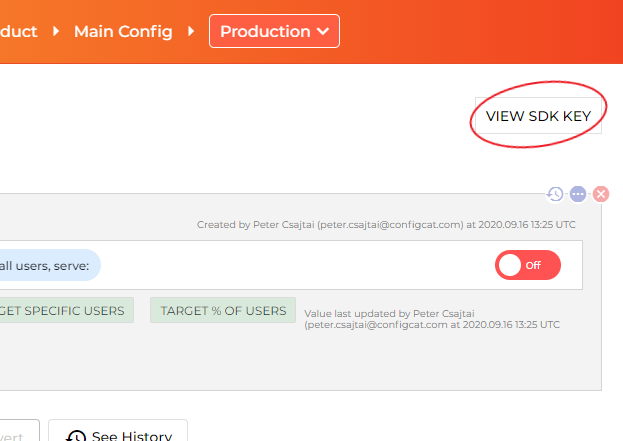ConfigCat SDK for Elixir provides easy integration for your application to ConfigCat.
ConfigCat is a feature flag and configuration management service that lets you separate releases from deployments. You can turn your features ON/OFF using ConfigCat Dashboard even after they are deployed. ConfigCat lets you target specific groups of users based on region, email or any other custom user attribute.
ConfigCat is a hosted feature flag service. Manage feature toggles across frontend, backend, mobile, desktop apps. Alternative to LaunchDarkly. Management app + feature flag SDKs.
def deps do
[
{:configcat, "~> 4.0.2"}
]
end2. Go to the ConfigCat Dashboard to get your SDK Key:
def start(_type, _args) do
children = [
{ConfigCat, [sdk_key: "YOUR SDK KEY"]},
MyApp
]
opts = [strategy: :one_for_one, name: MyApp.Supervisor]
Supervisor.start_link(children, opts)
endisMyAwesomeFeatureEnabled = ConfigCat.get_value("isMyAwesomeFeatureEnabled", false)
if isMyAwesomeFeatureEnabled do
do_the_new_thing()
else
do_the_old_thing()
endUsing this feature, you will be able to get different setting values for different users in your application by passing a ConfigCat.User object to the ConfigCat.get_value/3 function.
Read more about Targeting here.
user = ConfigCat.User.new("#USER-IDENTIFIER#")
isMyAwesomeFeatureEnabled = ConfigCat.get_value("isMyAwesomeFeatureEnabled", false, user)
if isMyAwesomeFeatureEnabled do
do_the_new_thing()
else
do_the_old_thing()
endThe ConfigCat SDK supports 3 different polling mechanisms to acquire the setting values from ConfigCat. After latest setting values are downloaded, they are stored in the internal cache then all requests are served from there. Read more about Polling Modes and how to use them at ConfigCat Docs.
Contributions are welcome. For more info please read the Contribution Guideline.







